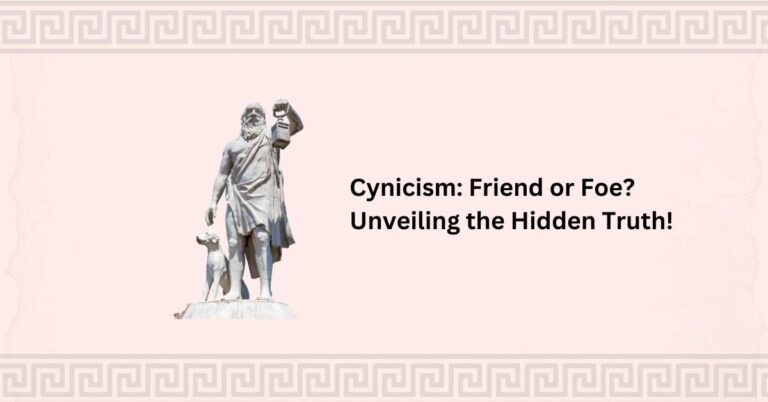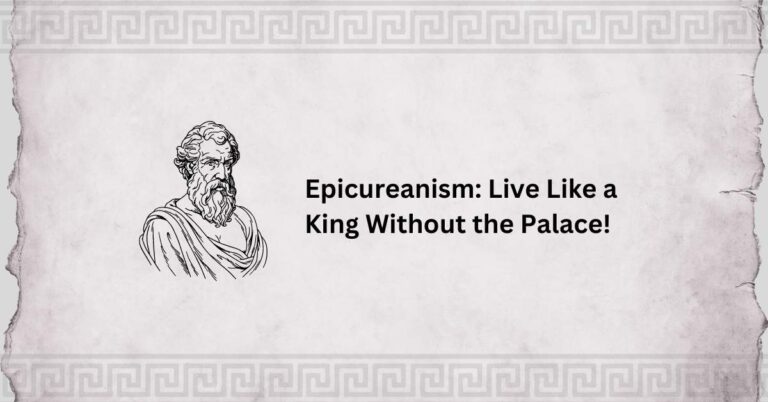Nihilism vs Existentialism vs Absurdism: Can You Escape the Meaningless Void?
Have you ever wondered what really shapes the way we view life and our choices? Let’s break down three fascinating philosophies that do just that: Nihilism, Existentialism, and Absurdism. These aren’t just highbrow concepts; they’re tools that help us navigate the chaos of our daily lives. Each philosophy offers a unique lens to look at life’s big questions: Why are we here? What should we do about it?
In this exploration, we’ll not only distinguish between Nihilism, Existentialism, and Absurdism but also weave together their connections. By understanding these philosophies, you can unlock new perspectives on your life’s purpose and challenges. Ready to take a closer look?
1. Understanding Nihilism:
What is Nihilism?
Nihilism begins with a challenging idea: life inherently lacks meaning. This philosophy, rooted in the Latin word ‘nihil’, meaning “nothing,” emerged prominently in the 19th century. It questions the foundation of all we believe—morals, values, and purpose. Think of it as staring into a vast, blank canvas where traditional guides on living and moral compasses vanish.
The Philosophical Giant: Friedrich Nietzsche
Friedrich Nietzsche, often synonymous with Nihilism, played a pivotal role in developing and discussing this philosophy. Contrary to popular belief, Nietzsche didn’t endorse Nihilism as a nihilist but critically examined its implications. He viewed it as a crisis in the foundational values of Western culture, which, he argued, had lost their power to guide and inspire. Nietzsche’s engagement with Nihilism was about overcoming this philosophical void and suggesting that it provides an opportunity for the creation of new values.
Core Beliefs of Nihilism
- Rejection of Conventional Morality: Nihilists argue that traditional moral values are baseless and enforce a false structure on human existence.
- Life’s Inherent Meaninglessness: At its core, Nihilism posits that life has no objective meaning, purpose, or intrinsic value.
Impact on Modern Culture and Thought
Nihilism’s footprint in modern culture is both deep and broad, influencing everything from literature and philosophy to films and music. It invites artists and thinkers to explore themes of existential dread, societal disillusionment, and the search for personal authenticity in a seemingly indifferent universe. In cinema, for example, nihilistic themes often surface in narratives where characters confront the absurdity of their existence and the futility of their actions.
2. Exploring Existentialism:
Existentialism is a philosophical movement that puts the individual at the center of its analysis. Born in the 19th century and blossoming in the 20th, this philosophy revolves around the idea that “existence precedes essence.” This means that individuals are responsible for imparting meaning to their otherwise indifferent existence. If you’re wondering how we navigate this world, Existentialism suggests it’s through personal choice and self-determined values.
Key Figures in Existentialist Philosophy
Jean-Paul Sartre and Simone de Beauvoir stand as titans in the world of Existentialism. Sartre’s declaration that “Hell is other people” isn’t just a pessimistic view of society but an insight into the existential belief that our freedom is constantly being negotiated with others. Simone de Beauvoir, on the other hand, explored the existential freedom of creating oneself, despite societal constraints, particularly in her groundbreaking work on feminism, “The Second Sex.”
Principal Concepts of Existentialism
- Individual Freedom and Choice: At the heart of Existentialism is the idea that every person is a free agent in a universe devoid of predefined patterns and laws. This freedom is both liberating and burdensome, as each choice we make helps to define who we are.
- Confronting Life’s Absurdity: Existentialists accept that life can be absurd. Rather than despairing over this, they suggest that we should define our own meaningful paths in an indifferent world.
Contributions of Existentialism to Literature and Psychology
Existentialist themes have left a profound impact on literature and psychology. In literature, authors like Franz Kafka and Albert Camus weave complex characters who struggle against and within absurd worlds, illustrating profound existential themes. In psychology, existential therapy emerged, focusing on individual freedom, choice, and the development of personal meaning as tools for dealing with anxiety and alienation.
3. Analyzing Absurdism:
The Essence of Absurdism
Absurdism explores the clash between our quest for meaning and the cold, indifferent universe that offers none. The term originates from the 20th-century wave of philosophical thought, with its roots deeply intertwined with Existentialism. However, while it shares existential concerns, Absurdism forges its own distinct path by focusing on the inherent conflict of human existence. It’s like finding yourself on a treasure hunt in a landscape that you’re not even sure contains the treasure.
Albert Camus: Architect of Absurdist Philosophy
Albert Camus, a philosopher and novelist, is often considered the father of Absurdism. Unlike many philosophers who weave complex jargon, Camus’s ideas reach us with clarity and power. His seminal works, such as “The Stranger” and “The Myth of Sisyphus,” illustrate the Absurdist philosophy in action. Camus argued that life is absurd, yet he rebelled against this notion with a call to embrace life’s beauty despite its irrationality.
Core Ideas of Absurdism
- Conflict Between Search for Meaning and Indifferent Universe: Absurdism posits that while humans are hardwired to seek meaning and order, the universe remains silent, offering no inherent purpose or guidance.
- Living with the Absurd: Camus suggests that recognizing life’s absurdity should not lead to despair; instead, it should empower us to live with vigor and defiance. Embracing the absurd means accepting the challenge of forging personal meaning without succumbing to nihilistic or cynical resignation.
Absurdism, Nihilism, and Existentialism: A Comparative View
While Absurdism, Nihilism, and Existentialism all grapple with the meaning of life, they offer distinct responses. Nihilism accepts the meaningless of life and often leads to detachment or resignation. Existentialism acknowledges life’s inherent lack of purpose but champions individual freedom to create meaning. Absurdism stands between these views, recognizing the absurdity but advocating for a life lived with personal integrity and passion, despite the lack of cosmic meaning.
Comparative Analysis of Philosophical Perspectives:
Understanding Nihilism, Existentialism, and Absurdism involves recognizing both their shared themes and distinctive approaches. Each philosophy offers a unique lens through which to view the challenges of human existence.
Similarities Across the Philosophies
All three philosophies address the fundamental question of life’s inherent meaning and how humans respond to it:
- Questioning of Traditional Values: Nihilism, Existentialism, and Absurdism all challenge established norms and religious dogmas, urging a reevaluation of what constitutes meaning and value.
- Focus on Individual Perspective: Each philosophy emphasizes personal experience as the basis for understanding the world, albeit with different outcomes and suggestions.
Distinguishing Between the Philosophies
While these philosophies overlap in their existential inquiry, they diverge significantly in their responses and philosophical conclusions:
- Nihilism views life as inherently meaningless and often leads to a rejection of established moral and ethical norms as illusory.
- Existentialism acknowledges life’s lack of inherent purpose but advocates for individuals to create their own meaning through choices and actions, thereby asserting personal freedom and responsibility.
- Absurdism acknowledges the futility of a search for meaning in a meaningless world but rejects the nihilistic response, proposing instead that one should embrace life’s absurdity as a foundation for a defiantly joyful existence.
Philosophy |
Key Philosophers |
Core Beliefs |
Ethical Implications |
Nihilism |
Friedrich Nietzsche |
Life has no inherent meaning or value. |
Rejects traditional morals; promotes existential freedom. |
Existentialism |
Jean-Paul Sartre, Simone de Beauvoir |
Life lacks inherent purpose; meaning is created through individual choices. |
Advocates for personal responsibility in creating ethics. |
Absurdism |
Albert Camus |
Life is inherently meaningless, but humans should still seek to find personal meaning. |
Embraces the absurdity of life and defies it with personal integrity. |
Practical Implications of Philosophical Insights:
Delving into philosophical theories might seem like an academic exercise, but their implications extend far into our everyday lives. Let’s look at how Nihilism, Existentialism, and Absurdism can influence modern thinking and guide us in daily life, especially in times of existential crises.
Nihilism in Daily Life
Nihilism can appear in modern culture as skepticism or cynicism, particularly towards conventional moral and ethical norms. It encourages questioning the status quo and may lead individuals to adopt a more detached view of societal expectations. In daily life, a nihilistic perspective might help someone detach from social pressures, although it could also foster a sense of disconnection or apathy.
Existentialism in Action
Existentialism empowers personal agency and authenticity. It suggests that we carve out our own paths by making choices that are true to ourselves, rather than following prescribed roles. This can be particularly liberating in careers, education, and personal relationships, where societal expectations often dictate a standard course of action. By applying Existentialist thinking, individuals actively shape their lives, making decisions that are deeply personal and meaningful.
Living with Absurdism
Absurdism teaches resilience and joy in the face of life’s inherent meaninglessness. For those facing personal or collective crises, such as a career failure or societal upheaval, Absurdism offers a way to find personal integrity by embracing life’s absurdity. This could mean finding humor or beauty in situations where neither seems apparent, thereby maintaining mental balance and personal satisfaction.
Applying Philosophy to Personal Experiences and Societal Issues
Each philosophy not only frames personal experiences but also offers unique approaches to societal issues:
- Nihilism might influence debates on ethical norms and legal structures, challenging traditional bases for justice and rights.
- Existentialism could be applied in educational reforms and therapy, emphasizing personal development and self-defined goals.
- Absurdism might be reflected in artistic movements and public narratives that explore the coexistence of contradictory truths in a chaotic world.
Relevance in Contemporary Existential Crises
In times of global uncertainty—be it environmental, political, or health-related crises—these philosophies gain acute relevance. Nihilism might provoke discussions on the foundations of our societal constructs. Existentialism offers a toolkit for individual resilience and action amidst chaos. Absurdism provides a lens to view the unpredictability of life with humor and courage.
Conclusion:
We’ve journeyed through the profound realms of Nihilism, Existentialism, and Absurdism, exploring their definitions, key thinkers, and the unique perspectives each offers on life’s inherent meaning—or lack thereof. From Nietzsche’s challenging insights to Camus’s defiant embrace of life’s absurdity, these philosophies provide more than just academic fodder; they offer real tools for understanding and shaping our existence.
These philosophies do more than fill textbooks; they equip us with frameworks to tackle life’s deepest questions and challenges. Whether it’s the freedom and responsibility championed by Existentialism, the questioning nature of Nihilism, or the defiant joy of Absurdism, each philosophy offers a unique lens through which to view our personal and collective crises.
Now, why not pause and reflect on which of these resonates most with you? Does the freedom to create your own meaning in a seemingly indifferent universe strike a chord, or does the idea of challenging societal constructs and norms light a fire in your belly? Maybe it’s the notion of finding humor and value in life’s absurdities that speaks to you. Whichever it is, embracing these philosophical insights can transform how you view life’s twists and turns.
Encourage your journey of self-discovery and deeper understanding. Dive into these philosophies further, debate them with friends, or simply ponder them in your quiet moments. How will you navigate the complexities of your life with the insights gained today?



